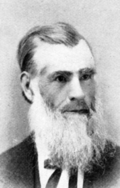|
William H. Gray (Oregon politician)
William Henry Gray (1810–1889) was a pioneer politician and historian of the Oregon Country in the present-day U.S. state of Oregon. He was an active participant in creating the Provisional Government of Oregon.[1] Gray later wrote the book A History of Oregon, 1792-1849 and was instrumental in the establishment of the Oregon Pioneer Society. BiographyGray came from New York. He came to the Oregon Country as a lay member of the Spalding-Whitman missionary group in 1836. He returned to New York in 1838 where he married Mary Augusta Dix. After a journey of 129 days they joined in Whitman and his wife. They were sent to work with the Spaldings in Idaho until November 1842. Gray resigned his post in 1842,[2] he went to the Salem area to work at the Oregon Institute. Gray later became a farmer and a sawmill operator. In the spring of 1843, Gray's house was the site of the first "Wolf Meeting", as part of the ongoing Champoeg Meetings. At a pioneer gathering on May 2, 1843, the French-Canadians and Americans present were divided about forming a "civil community."[3] Joseph Meek called for the division, and Gray seconded the motion for a division on the question. After voting on each article presented, the basis of the Provisional Government of Oregon was laid. Afterwards Gray was a member of the provisional legislature and of the committee that drafted the First Organic Laws for the provisional government. In 1854 he purchased a sheep flock numbering 400 in Iowa and took them overland across the continent.[2] Using a scow and the assistance of a steamboat, Gray sailed down the Columbia River for the Clatsop Plains. While navigating from Astoria the scow was harangued by a storm and sunk at Chinook Point with all of Gray's livestock.[2] Gray had eight children, five boys and three girls.[4] The second child was Caroline Augustus Gray, born 1840, who married Jacob Kamm in 1859 or 1860.[5] Published in 1870, Gray's A History of Oregon was not well received by historians of his era:
Historian Edward Gaylord Bourne endorsed these reviews in his 1902 article The Legend of Marcus Whitman. In 1936 historian T. C. Elliott described the book as "his so-called History of Oregon."[6]  Both a pioneer and a historian of Oregon, Gray is credited with being the guiding spirit behind establishment of the Oregon Pioneer Society at a meeting held in the hall of the House of Representatives at the Oregon State Capitol in Salem in October 1867.[7] He is buried at the site of the Whitman massacre next to the great grave near Walla Walla, Washington. Footnotes
Works
External links |
||||||||||||||||||||||
